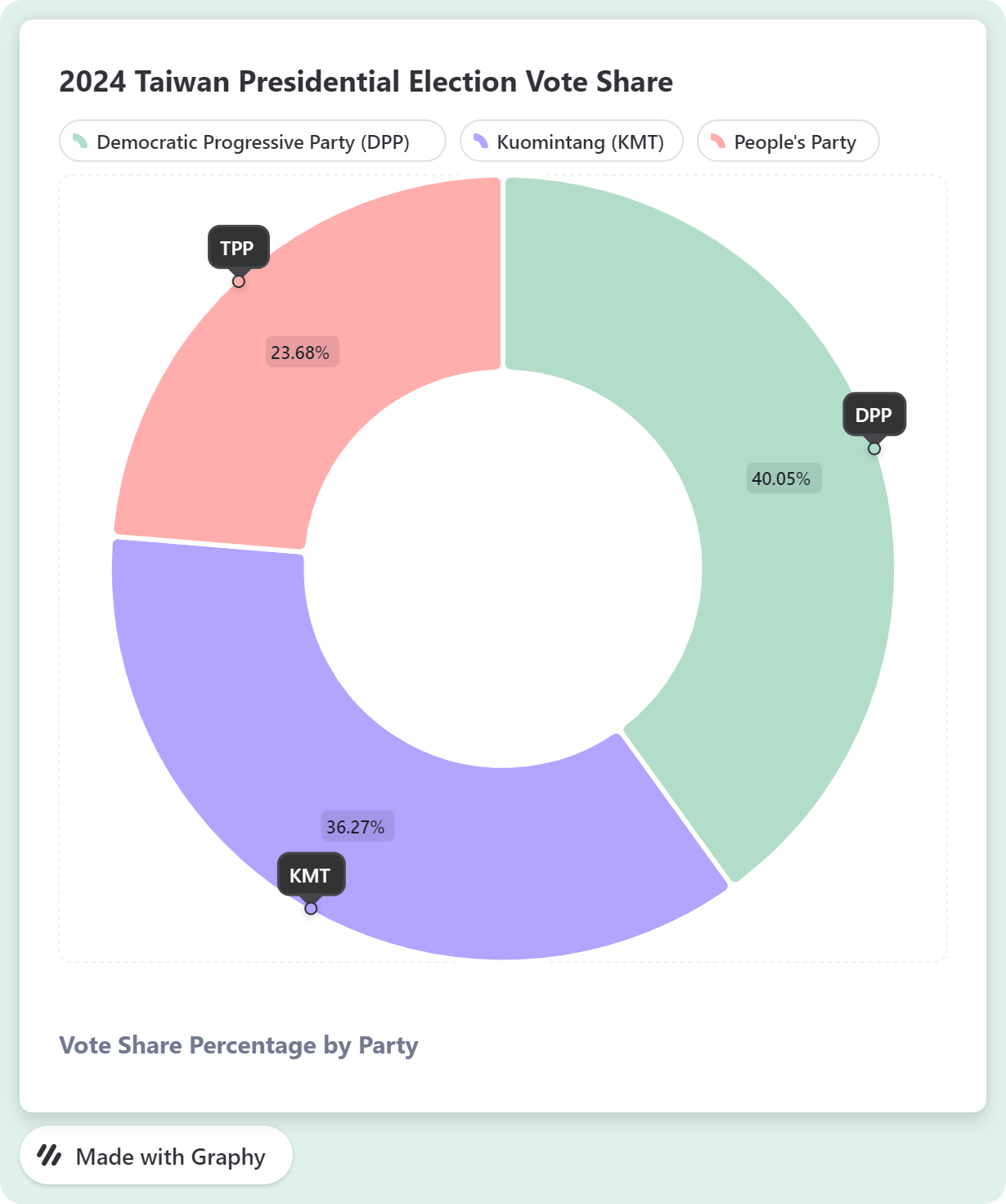On January 13, 2024, Taiwan conducted its 16th presidential and vice-presidential elections concurrently with the 11th Legislative Yuan elections. After a day of voting, the Democratic Progressive Party (DPP) candidates, William Lai (Lai Ching-te) and Hsiao Bi-khim, emerged victorious with 5,586,019 votes, securing a 40.05% vote share. They surpassed the Kuomintang (KMT) candidates, Hou You-Yi and Zhao Shaokang, who received 4,869,169 votes at a rate of 36.27%. Additionally, the Taiwan People’s Party (TPP) candidates, Ko Wen-je and Wu Hsin-ying, garnered 2,821,193 votes, representing a 23.68% vote share.

In the Legislative Yuan elections, the KMT won 52 seats, the DPP secured 51 seats, the TPP earned 8 seats, and 2 seats went to independent candidates, resulting in a scenario where no single party holds a majority.
William Lai’s Victory: DPP’s Continuation
William Lai’s triumph marks a consecutive term for the DPP. With a political career that includes roles such as Tainan City Mayor and Vice President, Lai based his campaign on the theme of “Uniting Taiwan, Safeguarding the Future.” He emphasized the preservation of Taiwan’s democratic freedoms, economic development, and the strengthening of ties with democratic nations, including the United States.
Lai’s win signifies the continued influence of the DPP in Taiwan’s political landscape. The party’s previous initiatives, such as legalizing same-sex marriage and promoting transitional justice, have garnered significant public support. Additionally, the DPP has achieved diplomatic milestones, such as joining the Comprehensive and Progressive Agreement for Trans-Pacific Partnership (CPTPP) and signing the Taiwan-U.S. Trade and Investment Framework Agreement (TIFA), elevating Taiwan’s international standing.
KMT’s Setback: Internal Reform Ahead
Hou You-Yi’s defeat signals a setback for the KMT. Formerly the Mayor of New Taipei City, Hou was a prominent figure within the party. His campaign focused on “Taiwan’s Security, Prosperity for the People,” highlighting the need to strengthen national defense and improve the economy.
The KMT’s failure to secure victory reflects the challenges facing the party in Taiwanese politics. While there was a slight improvement in the vote share compared to the 2020 presidential election, the KMT still struggled to reverse its electoral fortunes. The defeat has sparked internal calls for comprehensive party reform to regain political prominence.
TPP’s Surge as the Third Major Party, Key Role of Ko Wen-je
Ko Wen-je achieved the highest vote share for the TPP since its establishment. Formerly the Mayor of Taipei, Ko is a well-known figure in Taiwanese politics. His campaign centered on “Taiwanese Values, Generational Harmony,” emphasizing the preservation of democratic values and promoting intergenerational exchange.
Ko’s rise reflects the increasing diversity within Taiwanese society. Traditionally, Taiwan’s political landscape was dominated by the KMT and DPP. However, newer parties like the TPP are gaining traction, becoming a new force in Taiwanese politics.
Diverse Political Landscape: Three Parties Without a Majority
In this election, none of the three major parties – KMT, DPP, and TPP – secured a majority of seats. This implies a more diverse political landscape, requiring collaboration among parties to advance policies.
Regarding foreign relations, all three parties stress the importance of preserving Taiwan’s democratic freedoms and sovereignty. However, there are differences in approaches to enhancing Taiwan’s international standing. The KMT advocates for promoting “cross-strait peace,” while the DPP emphasizes strengthening ties with democratic nations, including the United States.
Economically, all three parties highlight the need to improve people’s livelihoods, but there are divergent views on how to promote economic development. The KMT supports free-market economic policies, while the DPP advocates for social equity.
Split-ticket Voting Pattern
Notably, Taiwan’s voters have long exhibited split-ticket behavior, and this election result is no exception. Reasons behind this phenomenon may include different preferences for national and local governance. For instance, voters might prioritize national development in the presidential election but focus on local affairs when voting for legislators.
This split-ticket behavior underscores the complexity and diversity of Taiwanese society. In the future, Taiwan’s political landscape is expected to become even more diverse, requiring parties to work harder to secure voter support.

